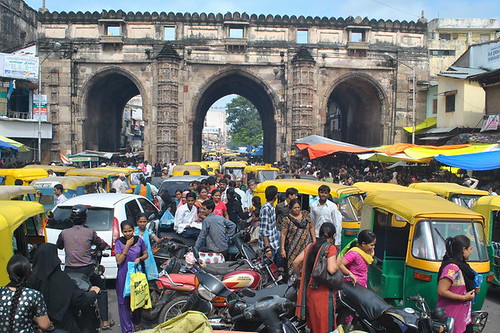By Dr. J.S.Bandukwala for TwoCircles.net
Gujarat elections are proving a heart break for many Muslim political activists. There was a hope that a Sadbhavna-inclined Narendra Modi may lead to BJP tickets for Muslims. It appears not one will make it to the saffron electoral team. Strange that such senior IPS officers, who have been singing the saffron tune, such as Shabbir Khandwawala or Abdullah Ibrahim Syed did not meet Modi’s bar. Equally the Sufi Mehboobali Bawa or the new lady Asifa Khan, a cross over from the Congress failed. Why ?
It is worth understanding the issue in depth. The BJP and its RSS patrons feel very allergic to Muslims. It goes back to its roots in the ideology of Veer Savarkar and Guru Golwalkar wherein the only place Muslims could occupy in society was as a second class citizen, totally subservient to Hindu thought and beliefs. But BJP being a political party had to show a few Muslim faces in public. In selecting Muslims for high positions, the BJP and RSS felt safe with those Muslims who were married to RSS savikas. That is how Sikandar Bhakt and later Mukhtar Abbas Naqvi and Shahnawaz Hussain rose into prominence. The other approach was to pick up a big name like Najma Heptullah, whose desperation for high office was not being fulfilled within the Congress. But such figures hardly carried any credibility with the Muslim public, especially in the background of Ayodhya and the Gujarat riots.

Teen-Darwaza bazaar of Ahmadabad. What options do Muslims have in this election?
The only serious attempt to win Muslims over to the BJP was made by Narendra Modi with his Sadbhavna programmes all over Gujarat. But this was after eight years of running Gujarat on an anti Muslim platform. From 2002 to 2010, Modi fought two Assembly elections and two Lok Sabha elections on themes of Hum Panch Hamare Pachees, and relief camps as baby producing factories. His politics appealed to Gujarati Hindus and he won landslides.
But his eyes were on the Prime Minister’s chair. Being a totally political person, he quickly realised that Gujarat alone could never make him Prime Minister. After all Gujarat had barely 26 Lok Sabha seats. Further communal politics can work in Gujarat where Muslims are barely 10 %. It pays to inflame the 90% against the 10%. But such a tactic can never work in states like Assam with Muslim population of 31 %, or West Bengal (25 %), Bihar (18%), or UP (19% ). These are the states that send about 200 members to the Lok Sabha.
The only way out was to follow Vajpayee and present himself as one acceptable to both Hindus and Muslims. That was too tall an order for one whom Muslims held responsible for the 2002 horrors. Further how to convince his saffron base to accept Muslims? There was a strong possibility that if he pushed his “sadbhavna” too far by promoting Muslims, his base would move towards Keshubhai Patel, and wipe out Modi completely. The only way out was to abandon his Muslim supporters, and save the Gujarat citadel. That is exactly what Modi has done by not giving any ticket to Muslims.
The same logic applies to Keshubhai, who too cannot give tickets to Muslims as that would turn his saffron supporters towards Modi. That just leaves the Congress, which will play as safe as possible by giving tickets to about seven Muslims. Note that as per their population there should be at least 18 Muslim MLA in Gujarat. Leave aside Assembly, there are no Muslim corporators in a big city like Vadodara. Gujarat has not sent a single Muslim to the Lok Sabha for over 20 years. The honest truth is that the average Gujarati Hindu will just not accept a Muslim as his representative. The only exception maybe President Abdul Kalam, whose credibility among Hindus is very high. But sadly he has hardly any credibility among Muslims. This only reflects the deep communalisation of our society.
Where does this leave the Gujarati Muslim? In a sense Golwalkar’s wish has been fulfilled in Gujarat. Muslims have been reduced in a political sense, to second class citizens. They have no voice in the administration right from Gandhinagar down to taluka panchayats.
Yet as a Muslim I am not worried. An absence of political power in one state is not so vital , so long as the country as a whole operates in a democratic secular manner. Rather I see this phase as one of social, educational and economic reform within the Muslim community. There has been a sharp rise in the number of Muslim schools, or the entry of Muslims into professional courses like engineering and medicine. Muslim businesses and industry are flourishing as never before. Wealth can be seen by the posh houses and mosques in Muslim localities, and the huge rise in Muslims going for pilgrimage to Mecca. The same is true of money lavished at weddings.
Muslims must vote for the best candidate, but otherwise stay away from politics. Let it be said that in the darkness of the 2002 killings, Muslims finally found the answer to live with dignity and respect, in the best tradition of Indian secularism and Islamic heritage.
—
Dr. Bandukwala is the president of Zidni Ilma Trust (http://www.zidniilma.com/).
